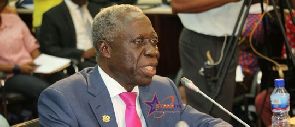| | General News 
[ 2017-03-15 ] 

Yaw Osafo-Marfo, Senior Minister Abrogating last-minute contracts will lead to judgment debts - Osafo-Marfo
Mr Yaw Osafo-Marfo, the Senior Minister, said some
of the contracts signed by the previous government
at the eleventh hour were not in the interest of
the state though abrogating them would lead to
judgment debts.
He said one of the challenges facing the current
government was that some contracts signed by the
previous one could not be implemented because they
were not in the interest of the state.
He said many of the contracts were signed by the
John Mahama-led Government in the last 14 days to
the end of its tenure and this amounted to breach
of good faith.
Mr Osafo-Maafo, who was the chairperson of the
then incoming government’s Transition Team, made
these remarks at a roundtable discussion organised
by the Institute of Economic Affairs (IEA), a
policy think tank, to review the 2017 Presidential
Transition in Accra, on the theme:
‘‘Strengthening Presidential Transitions in
Ghana’’.
The roundtable discussion brought together various
stakeholders including political party
representatives, civil society organisations and
donor partners that dispassionately discussed the
shortcomings in the transition law.
The meeting discussed some lapses in the
Presidential Transition Act, (Act 845) promulgated
in 2012 and proposed amendment to the law in order
to strengthen and deepen the country’s
democratic credentials.
Mr Osafo-Maafo said the Presidential Transition
Law required the outgoing government to submit the
handing over notes of the various ministries to
the Administrator-General’s Office of the
Presidential Estates Unit, 30 days before the
conduct of the general election.
He said even though he held meetings with the
chairperson of the outgoing government’s team,
Mr Julius Debrah, for mutual understanding and
ensure acrimonious-free process, the appointments
and contracts signed were against the spirit and
letter of the law.
For fairness sake, he said, the appointment of the
Auditor-General was in bad taste because, by law,
the Auditor-General was supposed to audit the
previous government and queried why he was
appointed at the last-minute.
Mr Osafo-Maafo reiterated the need to review the
Presidential Transition Law, saying the law needed
serious amendment in view of the lapses identified
after its implementation in the 2017 transition.
He said certain provisions in the law needed
clarity in view of inherent ambiguity and
challenges posed during the transition period.
Commenting on the transition process, he said
after the inauguration of the Transition Team, the
reports by the various ministries were not ready.
However, eight of the reports were presented three
days after the inauguration of the transition team
out of the 25 reports expected from the outgoing
government.
He expressed concern about non-availability of
Asset Registers for the ministries, adding that
the register was supposed to detail out all the
properties of the ministries for easy tracking and
evaluation.
Mr Michael Ofori Mensah, a Senior Research Fellow
of the IEA, said after 24 years of constitutional
rule, Ghana was viewed as a model of democracy in
Africa due to successive and peaceful elections.
However, he said, the process of regime change had
revealed institutional failures that undermined
the country’s democracy.
Mr Mensah said the acrimony that characterised the
transition process polarised the political
atmosphere and, therefore, advocated the review of
the law to ensure smoother transfer of political
power in the future.
He suggested that the Administrator-General’s
Office should report to Parliament every six
months or annually so that the legislative body
would have oversight responsibility over the
executive arm of government on the country’s
assets.
Mr Ben Abdallah Bandah, the Chairperson of the
Constitutional, Legal and Parliamentary Affairs
Committee, said the country must learn lessons
from the 2013 and 2017 Presidential Transitions in
order to improve upon the process.
He noted that the various political transitions
had been characterised by hostilities, acrimony,
accusations and counter accusations by officials
of the outgoing government and the incoming
government coupled with institutional failures.
He commended the IEA for its contribution towards
the country’s governance process.
Source - GNA

... go Back | |




